
Billionaire entrepreneur and investor Mark Cuban has emerged as a prominent voice critiquing the Securities and Exchange Commission (SEC)’s approach under Chairman Gary Gensler. Cuban’s concerns extend beyond economic policy; he suggests that the SEC’s stance on cryptocurrencies could sway voter sentiment and influence President Joe Biden’s bid for re-election. Here’s a deep dive into Cuban’s perspectives, the evolving regulatory landscape, and the potential political ramifications.
The Shift in Crypto Policy and Political Calculations
The Biden administration’s stance on digital assets has undergone notable shifts, partly influenced by former President Donald Trump’s vocal support for cryptocurrencies during his campaign. This change in dynamics has triggered reactions from both sides of the political aisle, with implications for electoral strategies and voter outreach.
Mark Cuban, known for his investments in tech and cryptocurrency sectors, has been actively engaging with policymakers to advocate for clearer, more supportive regulatory frameworks. At Coinbase’s State of Crypto Summit 2024, Cuban publicly criticized SEC Chairman Gary Gensler’s regulatory approach, particularly the bureaucratic hurdles faced by American crypto firms seeking compliance.
Cuban’s Critique of SEC’s Regulatory Landscape
During his address, Cuban highlighted what he perceives as a “uniquely American problem” created by the SEC’s registration processes. He argued that these stringent requirements stifle innovation and hinder the competitiveness of US-based crypto businesses on the global stage. Cuban’s critique resonates with many within the crypto community who view regulatory uncertainty as a barrier to growth and investment.
Moreover, Cuban emphasized the potential electoral consequences of Gensler’s policies. He suggested that the SEC’s crackdown on crypto could alienate a significant demographic of young voters who are increasingly drawn to digital assets. This demographic shift, combined with broader economic impacts, has led Cuban to speculate that Gensler’s approach could detrimentally affect Biden’s re-election chances.
Industry Backlash and Political Fallout
Cuban’s remarks were met with support from industry leaders and stakeholders, reflecting widespread concerns over the SEC’s regulatory stance. Paul Grewal, Coinbase’s Chief Legal Officer, publicly thanked Cuban for “saying the quiet part out loud,” acknowledging shared apprehensions within the crypto sector.
Republican Senator Bill Hagerty also weighed in during a Senate hearing, criticizing Gensler for what he perceives as a lack of proactive measures to foster innovation in the US crypto industry. Hagerty argued that the SEC’s regulatory framework has inadvertently pushed crypto innovation offshore, depriving American businesses of growth opportunities and stifling job creation in emerging sectors.
Political Implications and Strategic Considerations
Looking forward, the intersection of crypto regulation and electoral politics remains complex and multifaceted. The Biden administration faces a delicate balancing act between regulatory oversight and fostering technological innovation. As other countries advance with clearer regulatory frameworks, there is growing concern that continued uncertainty in the US could diminish its global competitiveness in the crypto sector.
From a strategic standpoint, stakeholders across the political spectrum are closely monitoring developments. The influence of crypto voters, a demographic increasingly engaged in financial policy discussions, is poised to play a pivotal role in shaping electoral outcomes. Cuban’s assertion that Gensler’s policies could impact Biden’s re-election underscores the evolving dynamics of digital assets in mainstream politics.
Conclusion
Mark Cuban’s critique of the SEC’s crypto crackdown reflects broader anxieties within the crypto community and raises significant questions about the intersection of regulation, innovation, and electoral politics. As the 2024 election approaches, the Biden administration’s handling of digital assets will likely remain a contentious issue, with implications for economic policy, investor confidence, and voter sentiment.
The ongoing debate underscores the need for nuanced approaches to regulatory reform that balance consumer protection with fostering technological advancement. As stakeholders navigate these complexities, the outcomes of regulatory decisions under Gensler’s leadership will undoubtedly influence not only the trajectory of the crypto industry but also the broader political landscape leading up to the presidential election.


Get the latest Crypto & Blockchain News in your inbox.